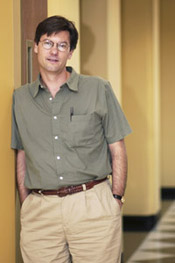by Elizabeth M. Smith

A University of Alabama chemistry class will explore different bacteria, including ones that eat sulfur and rock, through funding supplied by a National Science Foundation Award. Dr. Kevin Redding, associate professor of chemistry in the College of Arts and Sciences, recently was awarded the NSF CAREER Award and the Robin Hill Award for his groundbreaking photosynthesis research.
“Dr. Redding is rapidly becoming one of the stars in the field of photosynthesis, as evidenced by his two recent awards,” said Dr. Joseph Thrasher, professor and chemistry department chair. “He has led the charge to use technology in improving the delivery of material in the classroom and has had a positive influence on many undergraduate and graduate students.”
The Robin Hill Award, given by the International Society of Photosynthetic Research, honors Dr. Robin Hill, a British researcher who used chemistry and physics to investigate photosynthesis.
“I feel particularly honored to have won the Hill prize, because the foundation of the way we think about how photosynthetic electron transport occurs was established by Hill more than 40 years ago,” Redding said.
Redding’s first paper published at UA defended Hill’s finding that photosynthesis requires the collaboration between two photosynthetic reaction centers in green plants (Photosystem I and II) in the face of new and controversial results published in the high-visibility journals, Science and Nature. “It is not always fun to support the status quo, but I felt it had to be done, before those conclusions got into textbooks,” he said.
The NSF Faculty Early Career Development (CAREER) Program is the most prestigious award for new faculty members. The CAREER program recognizes and supports the early career-development activities of those teacher-scholars who are most likely to become the academic leaders of the 21st century.
“In the NSF CAREER project, we are looking at how electrons move, not between proteins within the plant cell, but inside individual proteins,” Redding said.
“Our move to Shelby Hall has allowed us to do truly inter-disciplinary work — at the intersection of biology, chemistry and physics. We are trying to understand how light drives electrons through proteins during photosynthesis and how nature can influence where an electron moves by laying down a ‘trail’ that is more or less attractive.
“We were the first to show that electrons can decide which of two trails in Photosystem I they are going to take,” he continued. “We are trying to explore what must have happened more than 2 billion years ago, when photosynthesis was evolving. A large part of this project is trying to answer the question: How did this system get set up, and what steps might nature have taken to give us what we have today?”
As part of the CAREER project, Redding also is developing a new course that focuses on the diversity of bio-energetic mechanisms that will illustrate how living organisms on Earth have discovered an incredible variety of ways to thrive.
“In this course we are going to look at the weird ones — bacteria that give off methane, burn hydrogen, and even eat rocks! And we won’t just talk about them, we’ll be growing them in the combined lecture/lab room and watch them actually do all these things while we’re discussing them,” Redding said.
On the educational side of the CAREER award is the continuation of the seminar course he has taught in UA’s Blount program, “Genes and Genesis: the Relationship between Evolution and Religion, Philosophy, and Ethics.” Redding said he decided to teach the course when a colleague of his conducted an informal poll of junior biology majors that found 75 percent of them did not believe in evolution.
“I was floored,” Redding said. “Evolution is the foundation of modern biology. It just does not make sense out of that context. I knew the cause of this “disbelief” was not the lack of convincing science, but the perceived conflict with religious beliefs and values. I believe we have a responsibility as scientists to educate young people not just in the facts of science and how science works, but also in the implications of that scientific knowledge. I think this is one of the great things about being in a place like the College of Arts and Sciences at UA, where you have the freedom to do something like this.”
Recently tenured, Redding has been a member of the UA faculty for six years. Before that he was a research scientist at the University of Geneva in Switzerland.
Further Reading